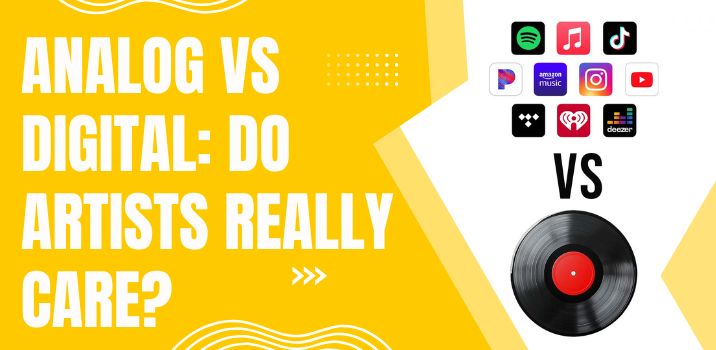Analog vs Digital: Do Artists Really Care?

11-March-2025
Analog recording captures sound as continuous waves, preserving the natural warmth and richness of the audio, while digital recording converts sound into binary data, offering precision and flexibility. The battle of the formats between Analog Vs Digital remains open among sound engineers and producers but how much of it matters to the artists and bands? Slash is the means to a purpose; the purpose is to make music people want to listen to. Whether you’re recording music at home music recording studio or hiring a recording studio space for rent, the benefits and drawbacks of each are important to consider. This blog explores whether the format truly matters to artists and how producers can use both to create standout songs.
The Warmth of Analog: Why It Still Appeals
Analog recording produces warm, rich, and natural sound and is preferred by many established artists and sound producers. While using analog, the sound is recorded as it is and in real form, without erasing some details that may be obscured during conversion to digital. Record players, decks, and mixing boards have surfaces and tones that make the song’s undesirable qualities more personal. Artists working at home music recording studio on genres like jazz, blues, and rock often prefer analog for its authentic and timeless feel. Despite technological advancements, analog remains a nostalgic choice that evokes emotion, reminding listeners of music’s organic roots.
The Versatility of Digital: Embracing Modern Tools
Digital recording has revolutionized the music industry by offering unmatched flexibility and convenience. From precision editing to unlimited tracks, digital tools empower producers to experiment and refine their work without boundaries. Using software plugins and digital audio workstations, one can control sounds and layer them to such detail that it becomes almost impossible to do so live. Besides, the concept of digital creates hype and makes music available to be created by anyone, including recording in households. For pop, EDM, and hip-hop, where details of sound design are important, digital opens up many possibilities that can be useful creatively and time-saving.
Artist Perspectives: Do They Notice the Difference?
Some artists ponder whether they should stay with the traditional analog or switch to digitally recorded music, and their decision depends on their target and desires. While one will find analog warm and inviting, another will find digital clear and efficient when capturing their vision. However, not all artists notice or prioritize the subtle differences in sound quality. Their primary focus often lies in delivering impactful music that resonates with listeners. Ultimately, artists rely on sound engineers and producers to make technical decisions, trusting them to use the format that best complements their style and enhances their overall sound.
Balancing Both Worlds: Hybrid Recording Techniques
As it has been discussed before, nowadays the majority of recording studio space for rent use both analog and digital equipment. It enables the producers to integrate aspects of the analog with the benefits of digital media production techniques. For instance, recording vocals and instruments on analog tape brings warmth and character, and digital mixing and editing offer speed and flexibility. For some musical genres, hybrid structures provide an opportunity to work with different sounds and allow producers to experiment with different layers. By blending both worlds, artists and producers can craft recordings that are both timeless and cutting-edge.
Finding the Right Fit for Your Studio Setup
Choosing between analog vs. digital often comes down to your studio’s goals, budget, and technical expertise. Analog gear requires significant investment and maintenance, making it ideal for studios prioritizing high-end, vintage-quality recordings. On the other hand, digital setups are cost-effective, compact, and user-friendly, suiting home studios and those seeking modern convenience. Many producers opt for hybrid setups to enjoy the benefits of both. Understanding your creative needs and technical capabilities is crucial to finding the right fit. Ultimately, your tools should serve your artistic vision, ensuring every recording resonates with your intended audience.
The goal should always be to create music that appeals to listeners, even as the analog vs. digital debate continues. Whether you lean toward analog warmth or digital precision, the key is to understand your tools and using them effectively. Great music production tools and equipment turn a home music recording studio or a recording studio space for rent into a viable business. Contact the team at UNION Recording Studios if you are a sound engineer or producer with specific ideas to enhance your work. Reach out today to elevate your recordings!